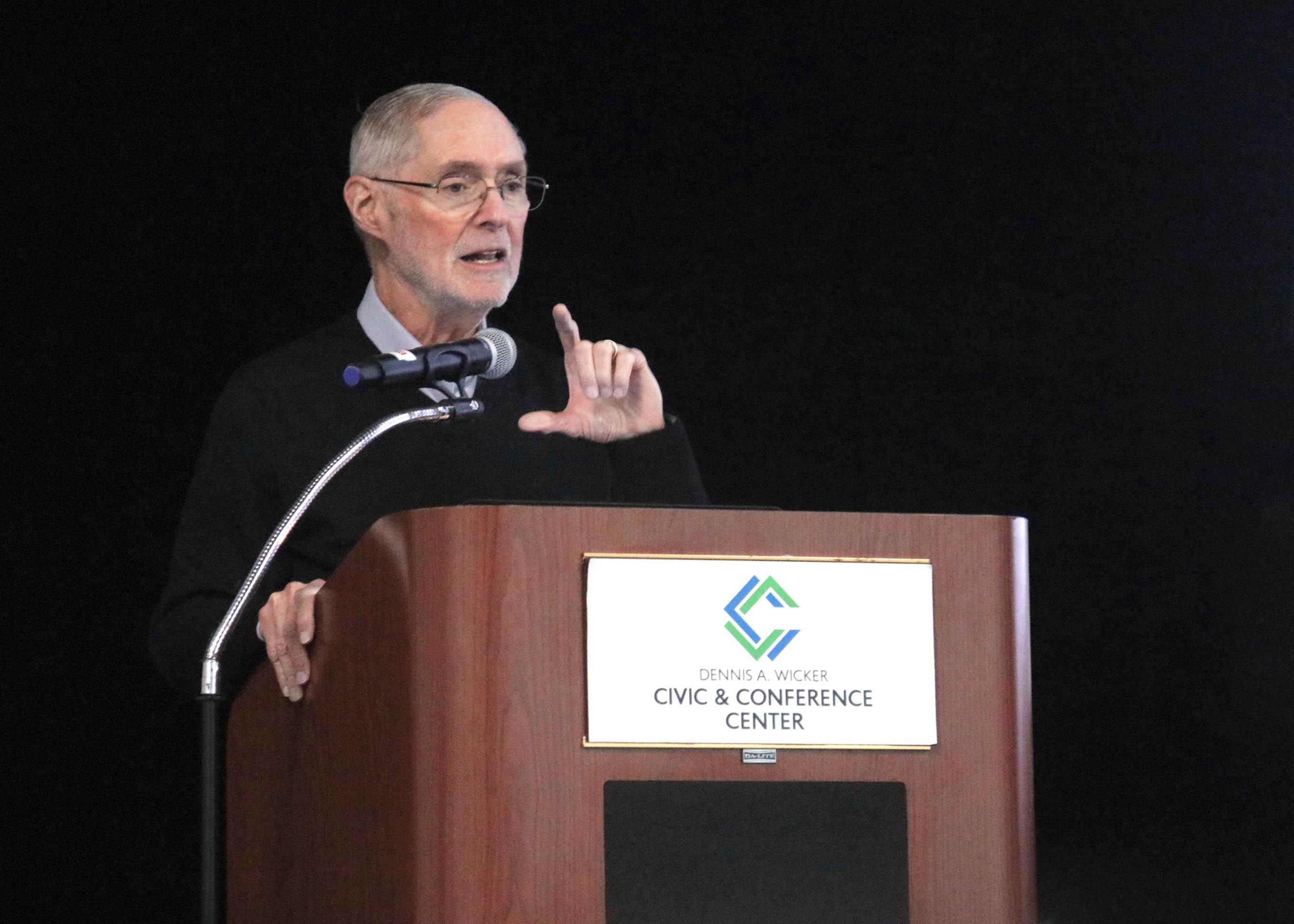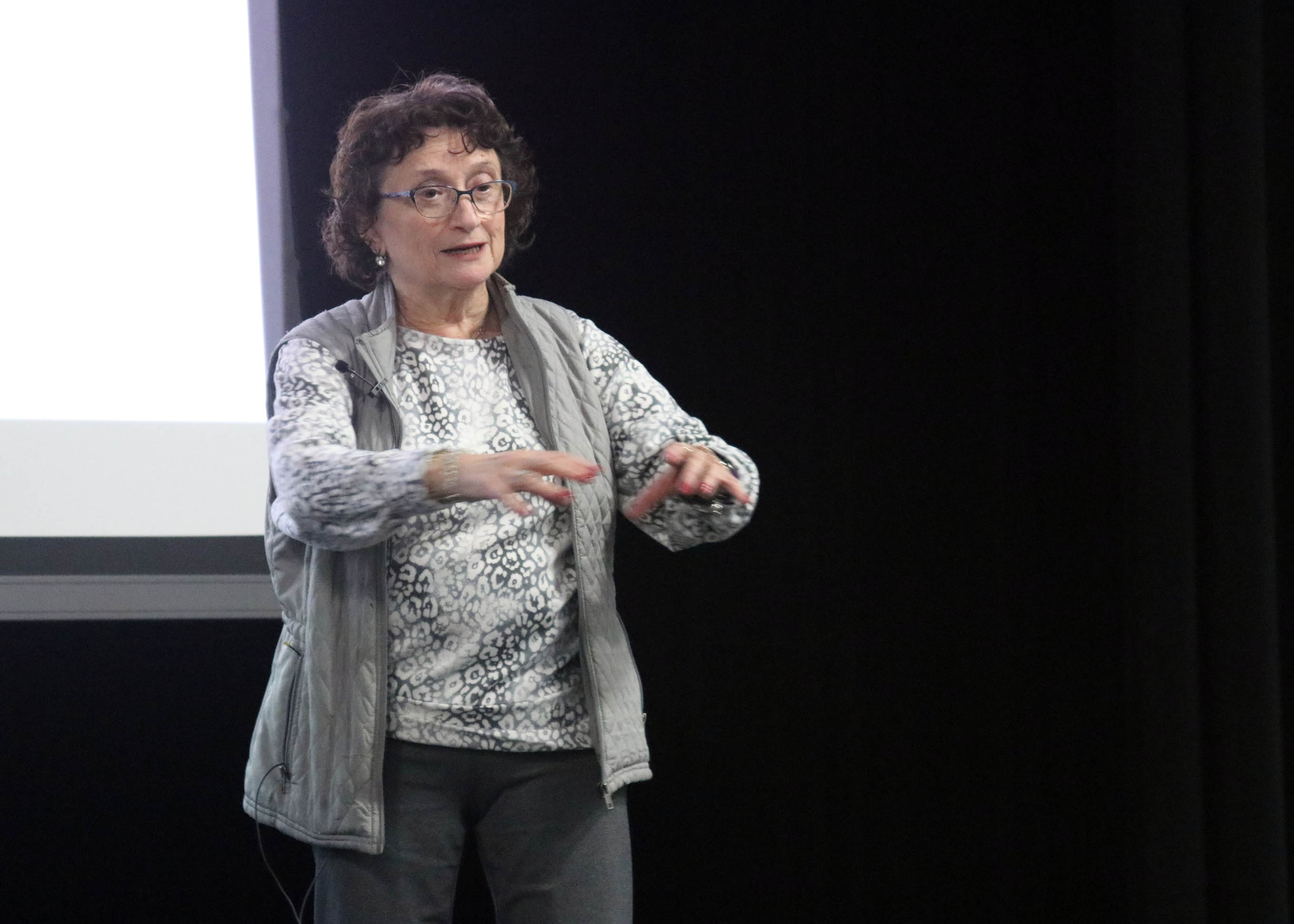
Rabbi Mike Stevens speaks during Central Carolina Community College's sixth-annual Holocaust Remembrance held on Feb. 28 at the Dennis A. Wicker Civic & Conference Center.

SANFORD - Six million Jewish people were killed by Nazis during the Holocaust, a scale of carnage that can be hard to grasp. If you read the victims' names, one every 15 seconds, it would take nearly three years to call the roll.
But numbers alone don't capture the human toll. So, Rabbi Mike and Judy Stevens have another suggestion: Listen to Holocaust survivors and their families. Hear their stories. And consider the lessons they learned.
That was the idea behind "The Story of My Mother: Klara Mermelstein," an hour-long talk focusing on Judy's mother, who survived the notorious Auschwitz-Birkenau concentration camp. It was presented for Central Carolina Community College's sixth-annual Holocaust Remembrance, held on February 28 at the Dennis A. Wicker Civic & Conference Center.
Standing in front of a large screen displaying photos of her ancestors and stories about their close-knit family, Judy recounted her mother's experience as a young woman, in her early 20s, when Nazis occupied her native Hungary late in World War II. Judy's husband, Mike, stood behind a podium across the stage, adding historical and philosophical context to help audience members understand one of the worst atrocities in human history.
The horror began slowly, Judy said, when Jewish residents in Hungary lost civil rights to operate a business or attend school. But things accelerated when they were forced to wear a yellow Star of David on their clothing to identify themselves as Jewish -- a Nazi policy that made it easier to round up those same residents just weeks later and force them into "ghettos," densely packed, walled-off portions of the city where Klara Mermelstein lived briefly with 11 people sharing one room with a bathroom and kitchen.
Despite the misery Jews were already suffering in Germany, her family never expected the same thing to happen to them. "Mom always felt, 'I'm Hungarian. Nothing's ever going to happen to me,'" Judy said. "There was this denial."
Things got even worse when Jews were herded from the ghetto onto railroad cars for a long trip with no food or water. Nazis told everyone they were being resettled. They were really being sent to Auschwitz.
As they entered the concentration camp in German-occupied Poland, healthy people who were able to work were sent to the right and survived, at least for a time. Elderly people and children about 14 and younger were sent to the left and gassed to death. Judy's mother was pushed right along with a sister and four friends. Her mother was pushed left. As Judy read from her mother's own writings, Klara Mermelstein described that horrible moment: "My mother looked at me as we were separated. She did not know why we were separated, and her eyes looked desperate. It was the last time I saw her."
Life in Auschwitz was brutal for those who lived. Five people slept in a bed, usually on rags and straw, and her mother was fortunate to share hers with relatives and friends, who huddled tightly together to stay warm. Prisoners in the camp were starving; her mother, whose job was to peel potatoes, survived by eating unserved scraps.
Still, that was far better than what was happening in another building not far away. By her second day at Auschwitz, Judy's mother understood the atrocity taking place. "She could smell the burning, and the burning was the flesh of people who did not survive, the ones who went to the left," Judy said. "But she didn't tell anybody. She kept it to herself, because she didn't want to scare everybody."
Over the course of months, Judy's mother survived forced labor and packed train trips among concentration camps, until one day the Red Cross showed up and announced that everyone was free. Because Klara Mermelstein and her sister were too sick to travel, they couldn't leave the camp for another three months. When they did, they returned to Hungary, where Judy's parents were married and Judy was born. Fearing a new wave of antisemitism when Russia invaded their homeland in 1956, Judy's family escaped, fleeing first to Austria, then to England and eventually Canada, where they settled in Montreal as refugees.
Klara Mermelstein, her sister and one brother survived the Holocaust. Her mother, father and three brothers did not. "The reason my mother got through the Holocaust was because she had a goal," Judy told the audience. "And her goal was not herself; it was to save her younger sister, who was 14 years old."
There were very few empty seats in a civic center auditorium packed with college students, elected officials and even a group of fourth- and fifth-graders from Tramway Elementary. Still, except for some conversation during a 15-minute question and answer session that covered topics ranging from immigration to how people should teach the Holocaust, there was not a sound as Judy and Mike recounted the history of Klara Mermelstein and her family.
"It's not over," Judy concluded, encouraging everyone to reflect on the recent resurgence of antisemitism and other prejudice in America. "There are people who are still treated like that. You must not forget that we are one story. We survived, but there are other people."
The Holocaust presentation was arranged through the Center for Holocaust, Genocide and Human Rights Education of North Carolina, a speakers bureau based in Chapel Hill. It was offered as part of CCCC ACES, the college's Academic and Cultural Enrichment Series, with assistance from the CCCC Foundation's Joyner Fund.
As guests moved in and out of the auditorium, many stopped in front of more than a dozen easels, taking in heartbreaking photographs of the Holocaust. Images of victims and sites like the Auschwitz concentration camp were framed in historical periods, beginning with Jewish life between the two World Wars and moving from Adolph Hitler's rise to power though life after liberation from Nazi rule.
The exhibit, titled "Shoah: How Was It Humanly Possible?," was provided by Yad Vashem, the World Holocaust Remembrance Center in Israel, and considered that question: How could something as immoral as the Holocaust -- or "Shoah," using the Hebrew word -- have happened at all? The final easel presented a quote from Primo Levi, a noted writer and Holocaust survivor. It came as an ominous warning, one that still resonates, even an ocean and many decades away: "It happened, therefore it can happen again."

Rabbi Mike Stevens speaks during Central Carolina Community College's sixth-annual Holocaust Remembrance held on Feb. 28 at the Dennis A. Wicker Civic & Conference Center.

Judy Stevens speaks about her mother, who survived the notorious Auschwitz-Birkenau concentration camp, during Central Carolina Community College's sixth-annual Holocaust Remembrance held on Feb. 28 at the Dennis A. Wicker Civic & Conference Center.